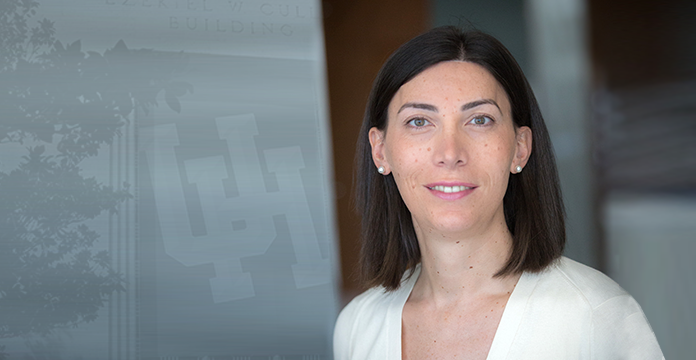Asking All the Right Questions: Emily Leproust (’01), Top Global Thinker

What if crops could self-fertilize? What if gene therapy could cure some of our deadliest diseases? What if data from our hard drives could be stored in DNA? These are some of the questions asked by Dr. Emily Leproust (’01), named one of Foreign Policy magazines Top 100 Global Thinkers and Fast Company’s 100 Most Creative People of 2015. With her illustrious work and growing company, Dr. Leproust is one of the top female executives in the world. She is the CEO and founder of Twist Bioscience, a company that manufactures DNA more quickly and cheaply than ever before. Despite the complicated, and sometimes controversial, nature of her work, she maintains a humble attitude, claiming that it is while on walks with her dog at the beach, near her home in San Francisco, that she gets her inspiration.
Leproust specialized in DNA chemistry as a student at the University of Houston (UH); now, she is a loyal donor who helps students to study at UH with their own chemistry fellowships. During her time at UH, under the professorship of Dr. Xiaolian Gao, she helped to create microarray technology that enabled thousands of small oligos (short pieces of DNA) to be synthesized in parallel. This was eventually patented. Born in France, her major epiphany while at UH was, “I’m not going back to France — I’m staying here!” The reason? She discovered just how receptive America was to the idea of one starting a company, as long as one worked hard enough. It was a spark she already had, as her parents had started their very own company when she was young. It seemed like the natural thing to do once she identified the need for DNA to be created more quickly and at a lesser cost than it was being manufactured. Soon, Twist Bioscience was born, and began manufacturing synthetic DNA using silicon instead of plastic.
Twist Bioscience has four major types of customers. The first group is made up of academics who need DNA to conduct research; the second group are medical researchers who use DNA at the beginning of experiments and use it to develop vaccines and drugs; the third group are those who make industrial chemicals; and the fourth are agricultural biologists who need DNA to increase crop yield.
The most important contributions to society that Twist Bioscience makes, in Leproust’s estimation, are threefold. First, she maintains that products, like plastics, can be manufactured in a sustainable way — without using oil — since her company’s customers use a yeast fermentation process which pulls carbon from the air. The second contribution is that Twist Bioscience contributes to human health through the development of new gene therapies that will cure many diseases. Thirdly, since these years are the golden era of biology by many scientists’ standards, Twist Bioscience is adding to the economic growth of the country. Genes are big business and as outlined earlier, there are many different uses and customers for this type of material.
So where does Leproust see her company in ten years? “I foresee a future where data is stored in DNA, as one of the market applications of our DNA synthesis.” Since data is a series of numbers, 0s and 1s, they can be sequenced in such a way that a building block of DNA corresponds with each number. That way, you would never have to be worried about your hard drive crashing. DNA stored data would always be accessible and could never be lost. “I also expect that we will integrate vertically within multiple market segments including industrial chemicals, pharmaceuticals and antibodies, among others.” she says. Leproust counts herself lucky to be able to make the world a better place. “DNA has a great potential to have a positive impact on humanity,” she says. She also believes in giving back, and has contributed to chemistry fellowship graduate students in the College of Natural Sciences and Mathematics at UH. “You help your family,” she explains graciously. “I received a fellowship while at UH and I want to encourage others to be their best.”
Her advice for current UH students is: “Try to be your best every day. Strive to be the best at whatever it is you do.” Leproust certainly takes this sentiment to heart as she attempts to better the living conditions of the planet with her work in synthetic DNA.
To keep up with the exciting work of Dr. Leproust and Twist Bioscience, please feel free to follow them at @emilyleproust or @twistbioscience. Or you can visit www.twistbioscience.com.